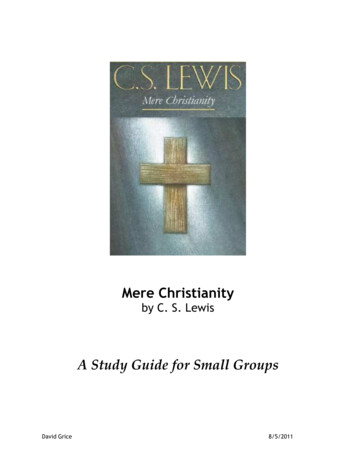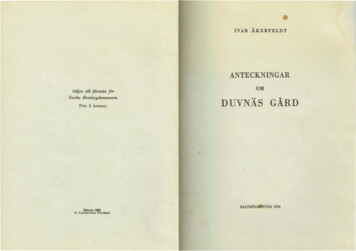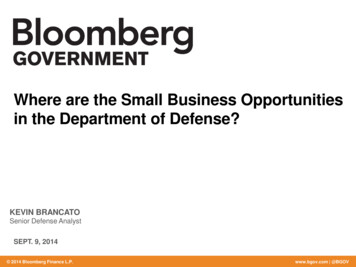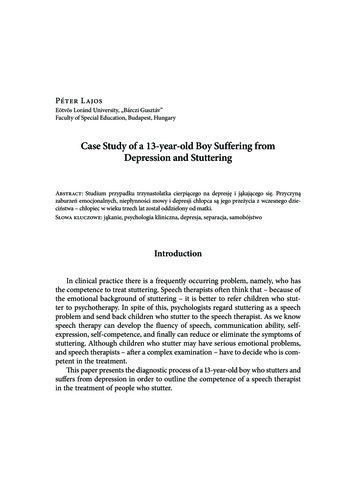
Transcription
Mere Christianityby C. S. LewisA Study Guide for Small GroupsDavid Grice8/5/2011
Mere Christianity Study GuideMere Christianity Study GuidePREFACE . - 1BOOK I: RIGHT AND WRONG AS A CLUE TO THE MEANING OF THE UNIVERSE . - 21.THE LAW OF HUMAN NATURE . - 22.SOME OBJECTIONS . - 33.THE REALITY OF THE LAW. - 44.WHAT LIES BEHIND THE LAW . - 55.WE HAVE CAUSE TO BE UNEASY . - 6BOOK II: WHAT CHRISTIANS BELIEVE . - 71.THE RIVAL CONCEPTIONS OF GOD. - 72.THE INVASION. - 93.THE SHOCKING ALTERNATIVE . - 114.THE PERFECT PENITENT. - 135.THE PRACTICAL CONCLUSION . - 20BOOK III: CHRISTIAN BEHAVIOUR . - 221.THE THREE PARTS OF MORALITY . - 222.THE CARDINAL VIRTUES . - 243.SOCIAL MORALITY . - 264.MORALITY AND PSYCHOANALYSIS . - 285.SEXUAL MORALITY . - 306.CHRISTIAN MARRIAGE. - 327.FORGIVENESS . - 358.THE GREAT SIN . - 389.CHARITY . - 4010.HOPE. - 4211.FAITH . - 4512.FAITH . - 47BOOK IV: BEYOND PERSONALITY: FIRST STEPS IN THE DOCTRINE OF THE TRINITY . - 511.MAKING AND BEGETTING. - 512.THE THREE-PERSONAL GOD . - 533.TIME AND BEYOND TIME. - 554.GOOD INFECTION . - 575.THE OBSTINATE TIN SOLDIERS . - 596.TWO NOTES . - 617.LET'S PRETEND. - 628.IS CHRISTIANITY HARD OR EASY? . - 649.COUNTING THE COST . - 6610.NICE PEOPLE OR NEW MEN . - 6811.THE NEW MEN . - 70Excursus: C. S. Lewis and Evolution . - 72David Grice8/5/2011-
Mere Christianity Study Guide-1-PrefacePREFACEWhy does Lewis not address the differences between denominations?1.2.cf. 1 Cor 1.18; Titus 3.9Where did Lewis get the title "Mere Christianity?"The words "Mere Christianity" came from Richard Baxter, a 17th century Anglican minister,in his book The Saints' Everlasting Rest.The concept goes back even further, to the 16th century, to Richard Hooker and his multivolume work Of the Laws of Ecclesiastical Polity, which was a masterful attempt at asystematic theology for the new Anglican Church. Lewis greatly admired Hooker and saidthis about him:"Hooker had never heard of a religion called Anglicanism. He would never have dreamed oftrying to “convert” any foreigner to the Church of England. It was to him obvious that aGerman or Italian would not belong to the Church of England, just as an Ephesian or Galatianwould not have belonged to the Church of Corinth."Uncle Toby is a character in the book Tristam Shandy, by Laurence Sterne. He makes thestatement "they are written in the Common-Prayer Book" in response to a question aboutthe duties of a married man.H.C.F. Highest Common Factor, the British equivalent of Least Common DenominatorWhat is Lewis' point about the H.C.F. of Christianity?Odium theologicum is Latin for theological hatred. How does this tie into Titus 3.9? Whoexhibits this the most in Lewis' experience?What would Lewis have thought of the extreme political correctness in our culture?"We simply cannot, without disaster, use language as these objectors want us to use it."Luke says the disciples were first called "Christians" at Antioch (Acts 11:26)How was it applied there? How should we define and apply it today?What analogy does Lewis use for Mere Christianity at the end of the Preface?What criteria does he give for picking the right room?How can we help those still in the hall?David Grice8/5/2011
Mere Christianity Study GuideBOOK I:1.-2-Book I-1RIGHT AND WRONG AS A CLUE TO THE MEANING OF THE UNIVERSETHE LAW OF HUMAN NATUREA. It is Universal1. Whether they admit it or not, all men recognize it, and even appeal to it.cf. Rom 2.14-162. It is not the same as the "laws" of physics or chemistry.What does this say about the difference between humans and other createdthings? cf. Gen 1.26- 27; 2.73. It cuts across all cultural, temporal, and geographical boundaries.From the Code of Hammurabi to "We hold these truths to be self-evident " thereare intrinsic notions of Right and Wrong. Differences are mostly in application,preferences, or technology. Perversions are limited to cults or societies that aregenerally short-lived.4. Some try to suppress it, or apply it inequitably. cf. Rom 1.18-23B. It is universally broken – no one is keeping the Law cf. Rom 3.9, 23; Jas 4.171. Why do humans not follow their own law as other objects do?cf. 2 Cor 4.3-4What is the result of this?2. The natural tendency of recognizing failure is to shift blame.But in actuality this proves our knowledge and guilt! cf. Gen 1.8-13CONCLUSION: Like it or not, there IS a Universal standard or Right and Wrong, or Law ofHuman Nature, and NO ONE is keeping it!David Grice8/5/2011
Mere Christianity Study Guide2.-3-Book I-2SOME OBJECTIONSA. "Moral Law" is just evolved herd instinct.1. Sometimes Right and Instinct conflict with each otherWe honor those who overcome fear to protect or save someone else even at theirown peril.There is a difference between "want" and "ought." This is precisely the differencebetween desire and conscience.cf. Rom 7.21-24"The Moral Law tells us the tune we have to play; our instincts are merely the keys."2. When two impulses conflict, the stronger should win.The very fact that there is a conflict tells us there is another set of impulses that is a"decider." This cannot be an instinct, but something with higher authority.-- cf. Gen 2.16-17; 3. 4- 53. If Moral Law were an instinct, we should have instincts that are objectively "good"and "bad."Instincts, are not good or bad; it is how we use or suppress them that determinesmorality.An important corollary: Making any instinct an absolute guide results in evil andcruelty. Mercy without Justice, or Justice without Mercy both have tragicconsequences.cf. Matt 12.7; Luke 1.50"The road to hell is paved with good intentions."B. Moral Law is just social convention1. Just because something is taught doesn't mean it can't be Moral Law. cf. Deut 6.4-9Conventions on the other hand must be taught and learned, and vary acrosscultures. Moral Law is inherently known or discovered.2. People tend to magnify the differences in morals between cultures.3. We make judgments about morals or conventions as to whether one is "better" thananother. This requires a higher standard by which to judge.QUESTION: Do Moral Laws change over time? What about their application?What examples does Lewis give to address this issue?Can you think of any others?David Grice8/5/2011
Mere Christianity Study Guide3.-4-Book I-3THE REALITY OF THE LAWA. The fact that humans do not follow their own nature has consequences1. Are the 'laws' that govern physical objects really laws in the moral sense?2. The Law of Human Nature tells what Man ought to do, not what he will do.The laws governing physical objects are just observable fact with no moralimplications.B. We try to explain away our failure to follow Moral Law because it is so odd1. Not a matter of what is best for us or societyThis argument leads to a tautology: "decent behavior is decent behavior."2. Not necessarily what is most convenientC. Moral Law must represent some different form of reality1. The fact that there is a moral imperative implies that there is more than one kind ofreality-- cf. 2 Cor 4.17-5.1; Rom 1.19-20;2. This reality comes from outside us and makes demands of us.C.S. Lewis must have studied the philosophical writings of Immanuel Kant, an 18th centuryGerman philosopher who had similar conclusions:The speculative employment of reason with respect to nature leads to the absolute necessity of somesupreme cause of the world: the practical employment of reason with a view to freedom leads also to absolutenecessity, but only of the laws of the actions of a rational being as such. Now it is an essential principle ofreason, however employed, to push its knowledge to a consciousness of its necessity (without which it wouldnot be rational knowledge). It is, however, an equally essential restriction of the same reason that it canneither discern the necessity of what is or what happens, nor of what ought to happen, unless a condition issupposed on which it is or happens or ought to happen. In this way, however, by the constant inquiry for thecondition, the satisfaction of reason is only further and further postponed. Hence it unceasingly seeks theunconditionally necessary and finds itself forced to assume it, although without any means of making itcomprehensible to itself, happy enough if only it can discover a conception which agrees with thisassumption. It is therefore no fault in our deduction of the supreme principle of morality, but an objectionthat should be made to human reason in general, that it cannot enable us to conceive the absolute necessity ofan unconditional practical law (such as the categorical imperative* must be). It cannot be blamed for refusingto explain this necessity by a condition, that is to say, by means of some interest assumed as a basis, since thelaw would then cease to be a supreme law of reason. And thus while we do not comprehend the practicalunconditional necessity of the moral imperative, we yet comprehend its incomprehensibility, and this is allthat can be fairly demanded of a philosophy which strives to carry its principles up to the very limit of humanreason.Fundamental Principles of the Metaphysics of Morals, 1785* There is therefore but one categorical imperative, namely, this: Act only on that maxim whereby thou canstat the same time will that it should become a universal law.David Grice8/5/2011
Mere Christianity Study Guide4.-5-Book I-4WHAT LIES BEHIND THE LAWA. Two main views of the Universe1. The Materialist ViewWhat is has always existed or came into being by random chance2. The Religious ViewThere is some mind behind the Universe with purpose and will3. Both views have existed from antiquity; one is not more 'modern' than the other.B. Science cannot determine which of these views is right1. Science can address "What?" or "How?" but not "Why?"2. True scientists understand this distinction.Whom does Lewis say usually confuses these issues?C. The only thing in the Universe we can know more about than we can learn fromobservation is .1. We could not deduce a Moral Law from mere external observation. Why?2. A message from a reality beyond our Universe would require a supernatural meansof delivery. cf. Deut 29.29; 1 Cor 2.6-13; John 1.9-143. What does the fact that we have received some message tell us?What does Lewis mean by the statement that "There has been a great deal ofsoft soap talked about God for the last hundred years."?D. Side note: The Life-Force PhilosophyThe view that some sort of impersonal force or élan vital is behind the Universe:"Matter or mind, reality has appeared to us as a perpetual becoming. It makes itself or it unmakesitself, but it is never something made. Such is the intuition that we have of mind when we draw asidethe veil which is interposed between our consciousness and ourselves. This, also, is what ourintellect and senses themselves would show us of matter, if they could obtain a direct anddisinterested idea of it."-- Henri Bergson, Chapter IV in Creative Evolution, 1911,1. Does this remind you of any movies?2. Why does this view fall apart?3. Why is it so attractive?4. What would you say to the question Lewis poses at the end of this chapter?David Grice8/5/2011
Mere Christianity Study Guide5.-6-Book I-5WE HAVE CAUSE TO BE UNEASYA. "Going back is the quickest way on."1. Going forward is not always progress if you are headed in the wrong direction2. Sometimes progress means turning the clock backward3. The sooner you correct the error, the faster progress will be madeWhy is this so difficult for us?B. What we can discover on our own about the source of Moral Law1. The Universe was made by a great but merciless artist2. This Being is interested in right conduct, or 'good.'3. However, this goodness is not indulgent or soft.4. If this Being is not a Person, there can be no forgivenessWhat is our dilemma with respect to goodness?-- cf. Isa 6.1-6; Heb 10.26-27, 12.28-29; Isa 47.12-15What is our only Hope and Comfort?-- cf. Rom 6.17-18, 7.21-8.1; 2 Thess 2.16-17C. We can't find comfort without first experiencing dismay cf. Matt 5.41. When does Christianity start to make sense?2. To whom did Jesus say He came?cf. Matt 9.10-13;3. What does Lewis say we must seek to find comfort?“Most of us have got over the pre-war wishfulthinking about international politics. It is timewe did the same about religion.”David Grice8/5/2011
Mere Christianity Study Guide-7-Book II-1BOOK II: WHAT CHRISTIANS BELIEVE1.THE RIVAL CONCEPTIONS OF GODA. One thing that Christians do not need to believe:1. Christians are free to think all religions have some elements of truthHow did Paul use this to his advantage in Acts 17?2. Atheists must convince themselves (and others) that most everyone else is wrongabout God3. Of course, some wrong answers are closer to the Truth than othersB. The first big division of Humanity: Do you believe in God or not?1. Christianity is on the side of the majority who say "Yes."2. Whom does Lewis say form the bulk of the minority who say "No"?C. The next big division: What is the nature of your God?1. Pantheism: God is transcends good and evilGod is beyond good and evil and once humans are enlightened, they will be also.What example does Lewis use to illustrate this relativistic viewpoint?2. Which religions does Lewis say hold the other point of view, that God is good?3. Another way to view the difference:The pantheistic god is part of the universe, and dependent on its existence. TheChristian God is not only independent but pre-existent to it.How is this connected with the idea that God is beyond good and evil?4. What do you make of this statement? "Christianity is a fighting religion.""I came not to bring peace, but a sword"-- cf. Matt 10.34-39; Luke 12.51-53David Grice8/5/2011
Mere Christianity Study Guide-8-Book II-1D. The big question: Why has the world gone so wrong?1. Why did Lewis (and many others) reject Christianity's answer to this question?2. Outline of Lewis' logic: The Universe is unjust and cruel. But how do I know what justice and cruelty are? If they are my own notions, I can't make this statement about the Universe. On the other hand, if they are absolute, transcendent realities, I must accept anordered reality and that the Universe has meaning.3. Lewis claims that "atheism is too ." Is that true?David Grice8/5/2011
Mere Christianity Study Guide2.-9-Book II-2THE INVASIONA. Another view that is too simple: "Christianity-and-water"1. God's OK, you're OK and He would never condemn anyone, much less send them tohell. C. S. Lewis calls this view, along with atheism, .2. Real things are not simpleWhat silly strawman argument does Lewis say "people who are not silly" use?3. How does Lewis say we should deal with such people?4. God did not invent religion, much less make it simple.5. Reality is usually odd, not neat and tidy.6. Reality is not usually what you would have guessed it to be.How does Lewis say this helps him believe Christianity is real?B. The dilemma: How can a Universe that is bad and meaningless contain creatures whoknow that it is bad and meaningless?1. Christianity says this is a good world gone bad.-- cf. Gen. 3.17-19; Rom. 8.20-232. Dualism says there are equal and opposite forces of good and evil battling for theUniverse.How does Lewis say Dualism compares to Christianity?C. The big problem with Dualism1. Good and evil cannot be mere preferences or they cease to have any true meaning.2. One must be right and the other wrong, or mistaken.3. This leads to the unavoidable conclusion that there is a standard from some Poweror Being that supersedes and hence created the other two.Our definitions of good and evil are merely descriptions of relationship with oragainst this Being.David Grice8/5/2011
Mere Christianity Study Guide- 10 -Book II-2D. Goodness is independent reality; evil is dependent on good for its existence.1. Wickedness is the pursuit of good in the wrong way.-- cf. Gen 3.6, 16.2; Lev 10.1,2; 2 Sam 6.5-72. "Badness is only spoiled goodness." No one likes badness for its own sake.3. Therefore goodness must precede badness.4. Lewis says this Bad Power of Dualism is a .5. To be bad requires things like intelligence and will, which are good things.6. How does this square with Christianity's view of the Devil?"It is a real recognition of the fact that evil is a ."Dualism falls apart because Evil cannot be independent of Good.E. Primary difference between Dualism and Christianity1. Similar to Dualism, Christianity believes in an Evil Being at war with Good.2. But Christianity believes this Being was created by God, and was originally good.3. Christianity views our world as being in a state of rebellion.-- cf. Eph 2.1-2; 1 John. 5.19; Jude 6; 2 Pet 2.4How does Lewis say Christianity describes our world in its present state?4. The rightful king appeared in the world, occupied enemy territory, incognito andis leading the resistance movement against the Evil One.There is no doubt as to the outcome or the victor!!!David Grice8/5/2011
Mere Christianity Study Guide3.- 11 -Book II-3THE SHOCKING ALTERNATIVEA. Is this current state of affairs in accordance with God's will?-- cf. Ezek 18.23,32; 33.11; 2 Pet 3.9; 1 Tim 2.3-41. If it is not, how can we explain God's omnipotence?2. What example does Lewis give of this idea?3. If a thing is free to be good it is also . cf. Gen 6.5-84. Free will makes evil possible but true love or joy is impossible without it.B. The outcome of Free Will1. The outcome must have been worth the cost.2. Lewis says arguing against God is like .“If God thinks this state of war in the universe a price worthpaying for free will then we may take it it is worth paying.”3. "The better stuff a creature is made of then the better it will be if it goes right, butalso the worse it will be if it goes wrong."C. Where Satan went wrong1. Wanting to be first—God, in fact. cf. Gen 3.5-6; Isa 14.12-142. Trying to find happiness apart from God leads to the opposite.3. The reason it never can work:God designed the human machine to run on . cf. Ps 1.1-4; John 4.31-344. This is the key to human failure throughout history.D. What God has done about it.1. He gave us conscience.2. He sent the human race .3. He selected a nation to forge into His own people.4. He came to earth as a Jewish man, and made a shocking claim.David Grice8/5/2011
Mere Christianity Study Guide- 12 -Book II-3E. For anyone but God to claim the authority to forgive sins is "so preposterous as to becomic."1. Why is this so?2. How did the opponents of Jesus react to these claims?-- cf. Matt 9.1-8; Luke 7.48-50; Mark 2.5-12;3. The possible alternatives to Jesus' identity:He is either , , or .“You must make your choice. Either this man was, and is, theSon of God: or else a madman or something worse. You canshut him up for a fool, you can spit at Him and kill Him as ademon; or you can fall at His feet and call Him Lord andGod. But let us not come with any patronising nonsenseabout His being a great human teacher. He has not left thatopen to us. He did not intend to.”Thomas answered him, "My Lord and my God!" -- John 20.28David Grice8/5/2011
Mere Christianity Study Guide4.- 13 -Book II-4THE PERFECT PENITENTA. So, God has infiltrated enemy territory as a man; the question is Why?1. Christians believe His main purpose was to suffer death and live again.-- cf. John 3.16-18; 1 Cor 15.3-4; John 1.29; Matt 20.25-28; Rom 4.23-25;2. Furthermore, this resulted in reconciling us to God and getting a fresh start.-- cf. Rom 5.1,2; Titus 2.11-14; Eph 2.4-73. Another related question is How? Christians have several theories about that.4. No single theory can completely explain it; the important thing is to accept andappropriate the reality. Theories do not replace reality; they merely describe it.Example: A man can enjoy and obtain nourishment from a good meal withoutunderstanding all the details of biochemistry and physiology. Similarly, "A man canaccept what Christ has done without knowing how it works: indeed he would notknow how it works until he has accepted it."James Jeans and Arthur Stanley Eddington were contemporary physicists andastronomers who debated about the nature of scientific methods, and describingand understanding reality."The essential fact is that all the pictures which science now draws of nature, andwhich alone seem capable of according with observational facts, are mathematicalpictures."-- James Jeans"From the intrinsic evidence of his creation, the Great Architect of the Universe nowbegins to appear as a pure mathematician."-- James Jeans5. The bottom line is that Christ was killed for us, our sins are removed and forgiven,and death has been crushed.B. Two of the theories described and contrasted1. Penal Substitution: Christ took our punishment so we don't have to.Why does Lewis think this is "a very silly theory"?2. Payment of debt: Christ paid a debt that we could never hope to pay.What was this debt? cf. Rom 5.12-14, 6.23; Col 2.13-15; Acts 3.193. What other theories do Christians have about this?David Grice8/5/2011
Mere Christianity Study Guide- 14 -Book II-4C. The nature of repentance1. As Lewis states in the previous chapter, we replaced God with self.2. This is not merely a flaw that needs correction, it is hostility and rebellion towardGod! cf. Rom 5.10; Col 1.21-223. Repentance is the act of laying down arms, ceasing hostility, having a change ofheart, and getting back on the right path.4. Repentance is not just hard—it is impossible except for a perfect man, but then hedoesn't need to do it.5. Repentance is not something God demands so He can take you back; it is simply adescription of what turning back to God is.6. How does God help us repent?D. The Catch-22 and a way out.1. We need to repent but we cannot. God on the other hand does not need to repent,so it is foreign to His nature. He cannot place that nature within us because it is notin His.2. But what if God became a man?3. Now God can not only submit, suffer, and die—He can do it perfectly!-- cf. 2 Cor 5.21; Gal 3.13; 1 John 3.4-54. We can share in God's death because He has died, but He had to become a man to doit.-- cf. Heb 2.14-15, 5.8-9; Gal 2.20; Rom 6.3-11; Phil 2.8E. The complaint (?!)1. Since Jesus was God, it was easy for Him.2. In what sense is this true?3. How does Lewis address this complaint? What examples does he give?“Such is my own way of looking at what Christians call theAtonement. But remember this is only one more picture. Donot mistake it for the thing itself: and if it does not help you,drop it.”David Grice8/5/2011
Mere Christianity Study Guide- 15 -Book II-4Arthur Stanley Eddington -- 28 December 1882 – 22 November 1944Sir Arthur Stanley Eddington was anEnglish astrophysicist of the early20th century. The Eddington limit,the natural limit to the luminosity ofstars, or the radiation generated byaccretion onto a compact object, isnamed in his honour.He is famous for his work regardingthe Theory of Relativity. Eddingtonwrote a number of articles whichannounced and explained Einstein'stheory of general relativity to theEnglish-speaking world. World War Isevered many lines of scientificcommunicationandnewdevelopments in German sciencewere not well known in England. Healsoconductedaneclipseexpedition in 1919 that provided oneof the earliest confirmations ofrelativity, and became known for hispopular expositions and interpretations of the theory.Eddington also investigated the interior of stars through theory, and developed the first trueunderstanding of stellar processes. He began this in 1916 with investigations of possible physicalexplanations for Cepheid variables. He began by extending Karl Schwarzschild's earlier work on radiationpressure in Emden polytropic models. These models treated a star as a sphere of gas held up againstgravity by internal thermal pressure, and one of Eddington's chief additions was to show that radiationpressure was necessary to prevent collapse of the sphere. He developed his model despite knowinglylacking firm foundations for understanding opacity and energy generation in the stellar interior. However,his results allowed for calculation of temperature, density and pressure at all points inside a star, andEddington argued that his theory was so useful for further astrophysical investigation that it should beretained despite not being based on completely accepted physics. James Jeans contributed the importantsuggestion that stellar matter would certainly be ionized, but that was the end of any collaborationbetween the pair, who became famous for their lively debates.During the 1920s and 30s Eddington gave innumerable lectures, interviews, and radio broadcasts onrelativity (in addition to his textbook Mathematical Theory of Relativity), and later, quantum mechanics.Many of these were gathered into books, including Nature of the Physical World and New Pathways inScience. Albert Einstein called Eddington's books "the finest presentation of the subject in any language."His skillful use of literary allusions and humor helped make these famously difficult subjects quiteaccessible.Eddington's books and lectures were immensely popular with the public, not only because of Eddington’sclear and entertaining exposition, but also for his willingness to discuss the philosophical and religiousimplications of the new physics. He argued for a deeply-rooted philosophical harmony between scientificinvestigation and religious mysticism, and also that the positivist nature of modern physics (i.e., relativityand quantum physics) provided new room for personal religious experience and free will. Unlike manyother spiritual scientists, he rejected the idea that science could provide proof of religious propositions. Hepromoted the infinite monkey theorem in his 1928 book The Nature of the Physical World, with the phrase"If an army of monkeys were strumming on typewriters, they might write all the books in the BritishMuseum". His popular writings made him, quite literally, a household name in Great Britain between theworld wars.David Grice8/5/2011
Mere Christianity Study Guide- 16 -Book II-4The English mathematician, physicist, and astronomer Sir James Hopwood Jeans (1877-1946) madeimportant contributions to the development of quantum theory and to theoretical astrophysics, especiallyto the theory of stellar structure.On September 11, 1877, James Jeans was born inOrmskirk, Lancashire, the son of a parliamentaryjournalist. He was brought up in a strict, very religiousVictorian home atmosphere. A precocious child, hewas reading by age 4 and had a remarkable ability tomemorize numbers. At an early age he also becameinterested in physics, as well as in mechanicaldevices, especially clocks - the subject of a short bookhe wrote at age 9.Jeans taught applied mathematics at PrincetonUniversity, N.J., from 1905 to 1909. He returned toCambridge as Stokes lecturer in 1910 but 2 years laterrelinquished the position and thereafter devoted fulltime to research and writing.In the first period of his scientific life (1901-1914),Jeans's interests were centered mainly on the kinetictheory of gases and the theory of radiation, especiallyapplied t
The words "Mere Christianity" came from Richard Baxter, a 17 th century Anglican minister, in his book The Saints' Everlasting Rest. The concept goes back even further, to the 16 th century, to Richard Hooker and his multi-volume work Of the Laws of











